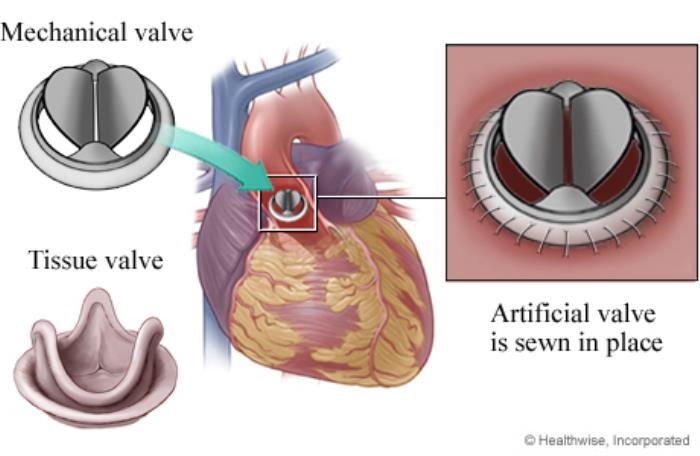Preparing for mitral valve replacement surgery is a crucial step to ensure the procedure’s success and minimize risks. Proper preparation involves understanding the need for surgery, undergoing essential evaluations, and managing any existing health conditions. This comprehensive approach helps patients, and their healthcare teams optimize outcomes and recovery.
Medical disclaimer: This content is for general awareness and does not replace a doctor’s consultation. For diagnosis or treatment decisions, consult a qualified specialist.
Understanding the Need for Mitral Valve Replacement
Mitral valve replacement is recommended when the mitral valve becomes severely damaged or dysfunctional due to conditions such as mitral stenosis or regurgitation. The procedure restores normal blood flow through the heart, relieving symptoms like breathlessness, fatigue, and swelling, and preventing long-term complications such as heart failure.
Types of Mitral Valve Replacement Surgery: Mechanical vs. Biological Valves
Patients may choose between mechanical and biological valve replacements based on their medical condition, age, and lifestyle. Mechanical valves are durable and long-lasting but require lifelong anticoagulation therapy. Biological valves, made from animal tissue, have a limited lifespan but often do not require prolonged anticoagulation, making them suitable for older patients or those unable to tolerate blood thinners.

Steps in the Pre-Surgical Evaluation Process
The pre-surgical evaluation begins with a thorough medical assessment to determine the patient’s overall health and suitability for surgery. This includes reviewing symptoms, understanding the severity of valve dysfunction, and evaluating potential risks. A collaborative approach between cardiologists and surgeons ensures a personalized treatment plan.
Diagnostic Tests Required Before Surgery
Essential tests include echocardiography to assess valve function and heart structure, electrocardiograms (ECG) to check for abnormal rhythms, and blood tests to evaluate overall health. Additional imaging, such as CT scans or cardiac MRI, may be performed to provide detailed views of the heart and surrounding structures for surgical planning.
Discussing Your Medical History with Your Healthcare Team
It is vital to share a complete medical history, including previous surgeries, medications, and any chronic conditions, with the healthcare team. This information helps in identifying potential complications and tailoring the surgical approach to the patient’s specific needs.
Managing Existing Health Conditions Before Surgery
Pre-existing conditions such as hypertension, diabetes, or respiratory issues must be managed effectively before surgery to reduce risks. This may involve adjusting medications, improving nutritional status, or undergoing specific treatments to stabilize health. Ensuring optimal condition prior to surgery enhances recovery and long-term outcomes.
Medications to Avoid Before Mitral Valve Replacement
Certain medications, including blood thinners like aspirin, warfarin, and non-steroidal anti-inflammatory drugs (NSAIDs), should be discontinued before mitral valve replacement surgery as they can increase the risk of bleeding. Always consult your doctor before stopping or adjusting any prescribed medication.
Preparing Mentally and Emotionally for Surgery
Mental and emotional preparation is crucial for a positive surgical outcome. Engage in stress-reduction techniques like meditation, breathing exercises, or counseling to manage anxiety. Clear communication with your healthcare team about concerns can also help ease pre-surgery stress.
Dietary Adjustments Before Surgery: What to Eat and Avoid
A balanced diet rich in fruits, vegetables, lean protein, and whole grains is recommended before surgery. Avoid foods high in sodium, unhealthy fats, and processed sugars to reduce complications like high blood pressure. Your doctor may advise fasting or dietary restrictions closer to the surgery date.

Importance of Maintaining a Healthy Weight Before Surgery
Maintaining a healthy weight reduces surgical risks, including complications with anesthesia and wound healing. Work with your doctor or a dietitian to adopt a weight management plan that supports your overall health without drastic changes.
Exercises and Physical Preparation for Surgery
Engaging in light exercises, such as walking or stretching, helps improve physical fitness and circulation before surgery. Avoid strenuous activities and consult your healthcare team to determine the safest exercises for your condition.
How to Arrange Post-Surgical Care and Support at Home
Prepare your home for a smooth recovery by arranging for comfortable sleeping arrangements, ensuring accessibility, and gathering necessary medical supplies. Coordinate with family members or hire professional caregivers to assist during the initial recovery period.
Packing Essentials for Your Hospital Stay
Pack essentials such as identification, insurance documents, comfortable clothing, toiletries, medications, and any medical devices you use. Include items for comfort, like a book or music, to help pass the time during your hospital stay.
Understanding the Risks and Benefits of the Procedure
Mitral valve replacement carries risks such as infection, blood clots, or complications with anesthesia but offers significant benefits, including improved heart function and symptom relief. Discuss these thoroughly with your surgeon to make an informed decision.
The Role of Blood Thinners Before and After Surgery
Blood thinners are typically adjusted before surgery to reduce bleeding risks. After surgery, they may be prescribed to prevent clots, especially if a mechanical valve is used. Follow your doctor’s instructions for safe medication management.
Discussing Anesthesia Options with Your Surgeon
Discuss the type of anesthesia to be used during surgery, whether general or regional, with your surgeon and anesthesiologist. This conversation will help address any concerns about pain management and potential side effects.
What to Expect on the Day of Surgery
On the surgery day, expect pre-operative procedures like blood tests, IV insertion, and a consultation with your surgeon and anesthesiologist. Follow fasting instructions and arrive at the hospital at the scheduled time for a smooth check-in process.
Preparing Your Family or Caregiver for the Recovery Process
Educate your family or caregiver about your post-surgery needs, such as mobility assistance, medication management, and emotional support. Having a well-informed support system is critical for a comfortable recovery.
Factors That Influence the Success Rate of Mitral Valve Replacement Surgery
Explore key factors that affect the success rate of mitral valve replacement surgery, including patient health, surgical technique, and post-operative care.
The Role of Physical Therapy in Post-Mitral Valve Replacement Recovery
Understand the importance of physical therapy after mitral valve replacement surgery and how it aids in improving heart function and overall recovery.
Conclusion: Ensuring a Smooth Surgery and Recovery
Preparation for mitral valve replacement includes managing medications, diet, mental readiness, and post-surgical support. Taking proactive steps and working closely with your healthcare team ensures the best possible surgical outcome and recovery experience.
Best Mitral Valve Replacement Surgery in India
The Best Mitral Valve Replacement Surgery in India is designed to restore heart function in patients with mitral valve disease, providing effective solutions to improve quality of life and heart health.
Best Mitral Valve Replacement Surgeons in India
The Best Mitral Valve Replacement Surgeons in India are skilled in valve replacement techniques, providing personalized care to achieve successful outcomes for patients with mitral valve conditions.
FAQ
What diagnostic tests are required before mitral valve replacement surgery?
Tests include echocardiograms, electrocardiograms (ECG), chest X-rays, and blood work to assess heart function and overall health before surgery.
Are there any medications I should stop taking before surgery?
Yes, blood thinners and certain supplements should be stopped before surgery. Consult your doctor for a complete list of medications to avoid.
How long should I prepare before undergoing mitral valve replacement?
Preparation time varies but generally involves weeks of optimizing health through diet, exercise, and medication adjustments. Your doctor will guide you on a specific timeline.
What dietary changes should I make before the procedure?
Adopt a heart-healthy diet low in sodium, unhealthy fats, and processed foods. Your doctor may also recommend fasting before surgery.
How can I ensure a smooth recovery after mitral valve replacement?
Follow your doctor’s recovery plan, which includes medication adherence, physical therapy, regular checkups, and maintaining a healthy lifestyle with support from family or caregivers.
Explore the Best Heart Care Resources in India
Find some of the top cardiologist, surgeons and the best heart hospitals in India
Best Heart Hospitals in India
Choosing the right hospital is crucial for successful heart treatments. If you want to explore trusted options, check the list of Best Heart Hospitals in India offering world-class facilities, advanced cardiac care units, and experienced teams for both simple and complex procedures.
Best Cardiologists in India
Finding the right cardiologist can make a huge difference in early diagnosis and long-term heart health. If you are looking for the Best Cardiologists in India, see this curated list of experts who specialize in preventive care, interventional cardiology, and complex heart disease management. Check the full list Best Cardiologists in India.
Best Cardiac Surgeons in India
If you are planning for heart surgery and need top-level expertise, we recommend exploring the Best Cardiac Surgeons in India. These surgeons have a proven record in performing bypass surgeries, valve replacements, and minimally invasive heart operations with excellent outcomes.
Get more indepth information on Cardiology treatments and their costs.
Conclusion
Your cardiology health deserve the best care. Explore the links above to learn more about the top cardiac hospitals and cardiac surgeons in India.
Discover how mitral annuloplasty restores heart function by repairing the mitral valve. Learn about symptoms, preparation, success rates, and choosing the right surgeon for this life-changing procedure. Improve your heart health with expert insights and effective treatment options. Understanding the Role of Mitral Annuloplasty in Valve Repair
Learn about the anatomy, function, and common disorders of the mitral valve. Discover diagnostic tests, surgical options, and the latest repair techniques. Get tips on prevention and advice for living with mitral valve conditions. Empower your heart health today! Mitral Valve Anatomy: Structure, Function, and Common Disorders
Explore the latest advancements in percutaneous mitral valve interventions, including costs in India, recovery times, and patient outcomes. Learn what to expect during the procedure and discover how cutting-edge technologies are transforming heart valve treatments. Percutaneous Mitral Valve Interventions: What's Coming Next?